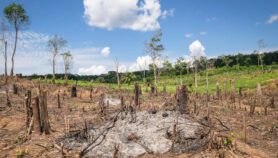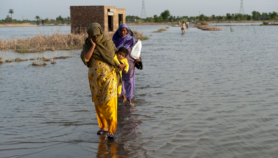Send to a friend
The details you provide on this page will not be used to send unsolicited email, and will not be sold to a 3rd party. See privacy policy.
Saleemul Huq says the time is now ripe for the development community to engage with climate change.
The scientific evidence — from hurricanes in the Caribbean to floods in Asia, droughts in Africa and the melting of glaciers and polar ice sheets — all points towards one thing: that human induced climate change is not something of the future but something we are already in the middle of.
For many ecosystems and communities (mainly the poor and vulnerable) climate change will have dangerous and inevitable impacts within the next one or two decades, despite efforts to reduce emissions of greenhouse gases.
This is why the time is ripe for us to redouble our efforts to mitigate climate change, while also adapting to its near-term impacts and helping those who do not have the capacity to adapt on their own.
Mismatched communities
The climate change and development communities are generally very different in terms of their disciplines, perspectives and time horizons. This has made dialogue between the two communities relatively difficult, until now.
The climate change community is largely drawn from natural science or technology-based disciplines, while the development community tends to be more social science based. Similarly, climate change predictions tend to be long term, typically for a hundred years, while the development community generally looks only five to ten years ahead.
And while the impacts of climate change are reasonably robust at the global scale they are more uncertain at the local scales where most of the development community operates.
But this is now changing. Climate change scientists are learning to refine their predictions. As a result, the information available regarding the potential impacts of climate change at different locations is getting much better.
Engaging with the issue
The development community has an unprecedented opportunity to engage with climate change, and must realise that its impacts are a reality that simply cannot be avoided. The poorest developing countries, and the poorest communities in those countries, are the ones most at risk.
Low lying coastal areas, such as islands and river deltas risk being flooded and becoming saline. People living in river basins dependent on glacial ice-melt will be especially vulnerable to reduced water flow, and arid and semi-arid zones will have more frequent droughts.
At a global level the problem of climate change is one of global social justice, as the impacts will be felt most by the people who have contributed the least towards creating the problem.
Climate change also affects development financing. Climatic risks must be taken into account before committing to more investments, if purely from the perspective of responsibility to the donors.
Developing countries themselves need to become more aware of the problem and to take steps to adapt to the impacts of climate change. So far the level of such awareness is quite low amongst the least developed countries, although higher amongst the small island developing states.
And while it is good to be country or partner-driven in identifying development needs, we cannot expect poor or vulnerable communities to identify adapting to or mitigating climate change as priorities themselves. The responsibility lies with the development partners to bring the issues up in discussions.
Even on the issue of reducing greenhouse gas emissions there is much that can be done to promote cleaner and renewable energy technologies while providing development benefits to the world’s poor.
The way forward
So how should we seize this opportunity? Individuals and organisations working in development need to be more aware of how climate change might affect them and their partners. We need to build up resilience to climate change through training and raising awareness.
Coalitions of like-minded development and environmental organisations, such as Stop Climate Chaos in the United Kingdom are ideal ways to raise awareness in developed countries, through advocacy and lobbying work.
We in the West must not neglect our own responsibilities to minimise our contribution to global warming. This starts with calculating our individual and organisational ‘carbon footprints’, and reducing emissions caused by heating and air travel as much as possible. Whilst this cannot be reduced to zero, we can offset the residual amounts by investing in actions such as tree planting.
Community based adaptation is a growing area of interest amongst non-governmental organisations and other groups working with poor and vulnerable communities in developing countries. An international workshop on this topic was held in Bangladesh in January 2005, and a second is planned for January 2007.
Finally, the development community should engage more vigorously in the annual UN Framework Convention on Climate Change meetings. One avenue to do so is by attending the two-day side event called ‘Development and Adaptation Days at COP’ organised by the International Institute for Environment and Development and the Regional and International Networking Group. The next one will be held in Nairobi, Kenya in November 2006.
Saleemul Huq is director of the climate change programme at the International Institute for Environment and Development, United Kingdom and chair of the Bangladesh Centre for Advanced Studies. He is also the chair of SciDev.Net’s advisory panel on climate change.













